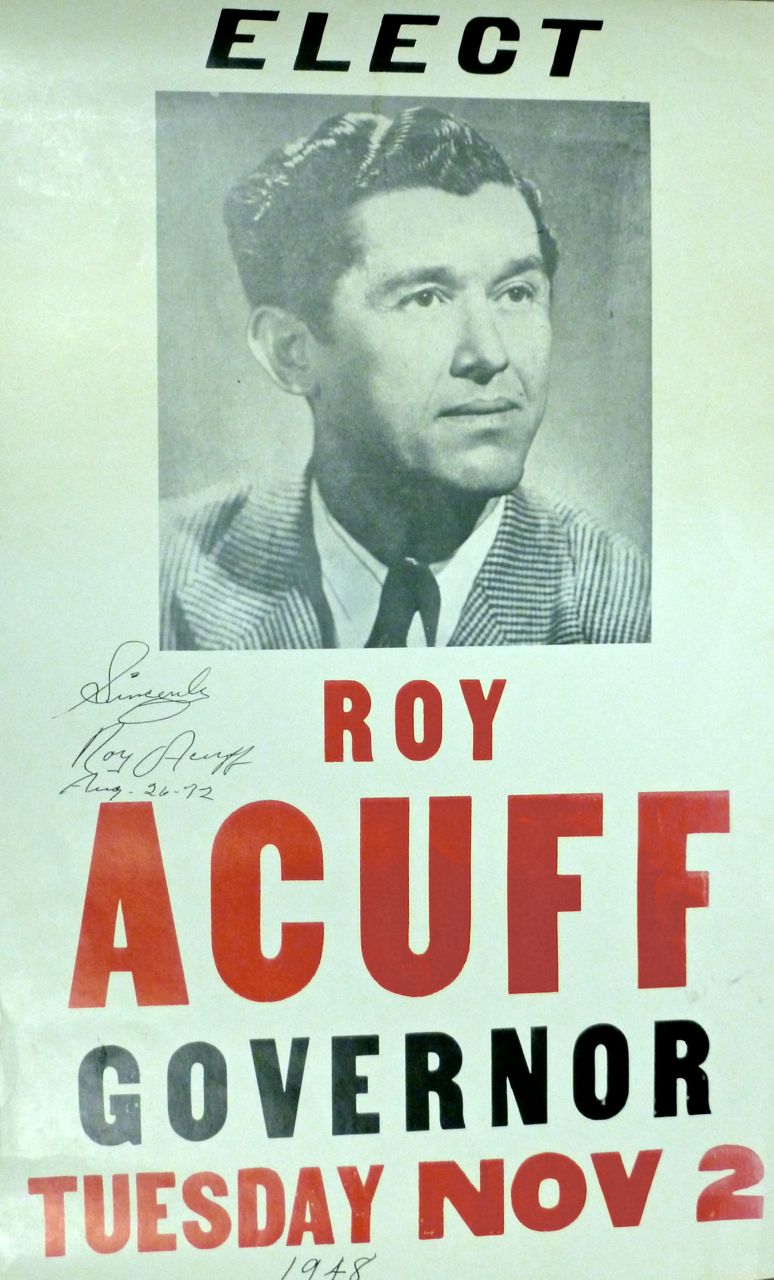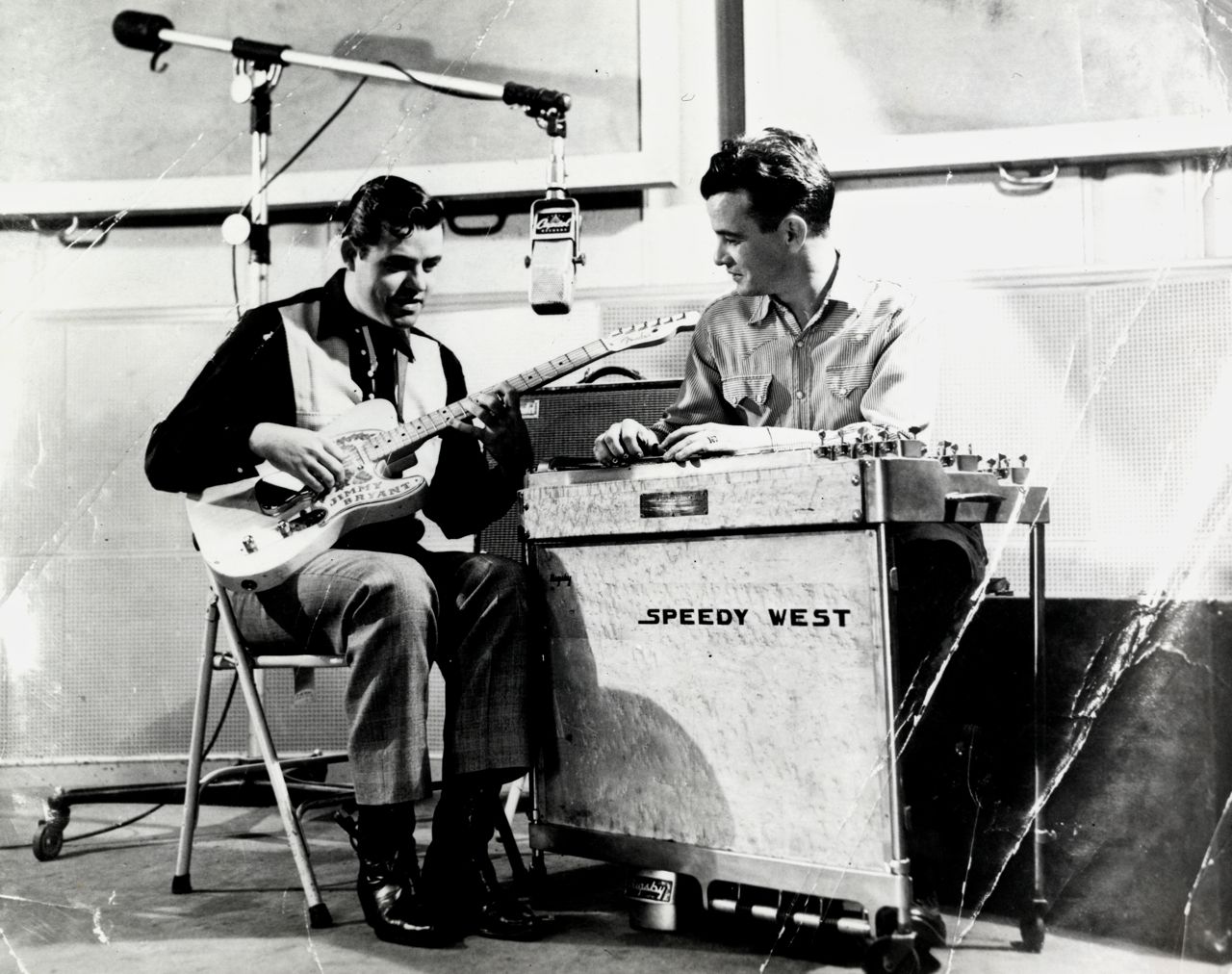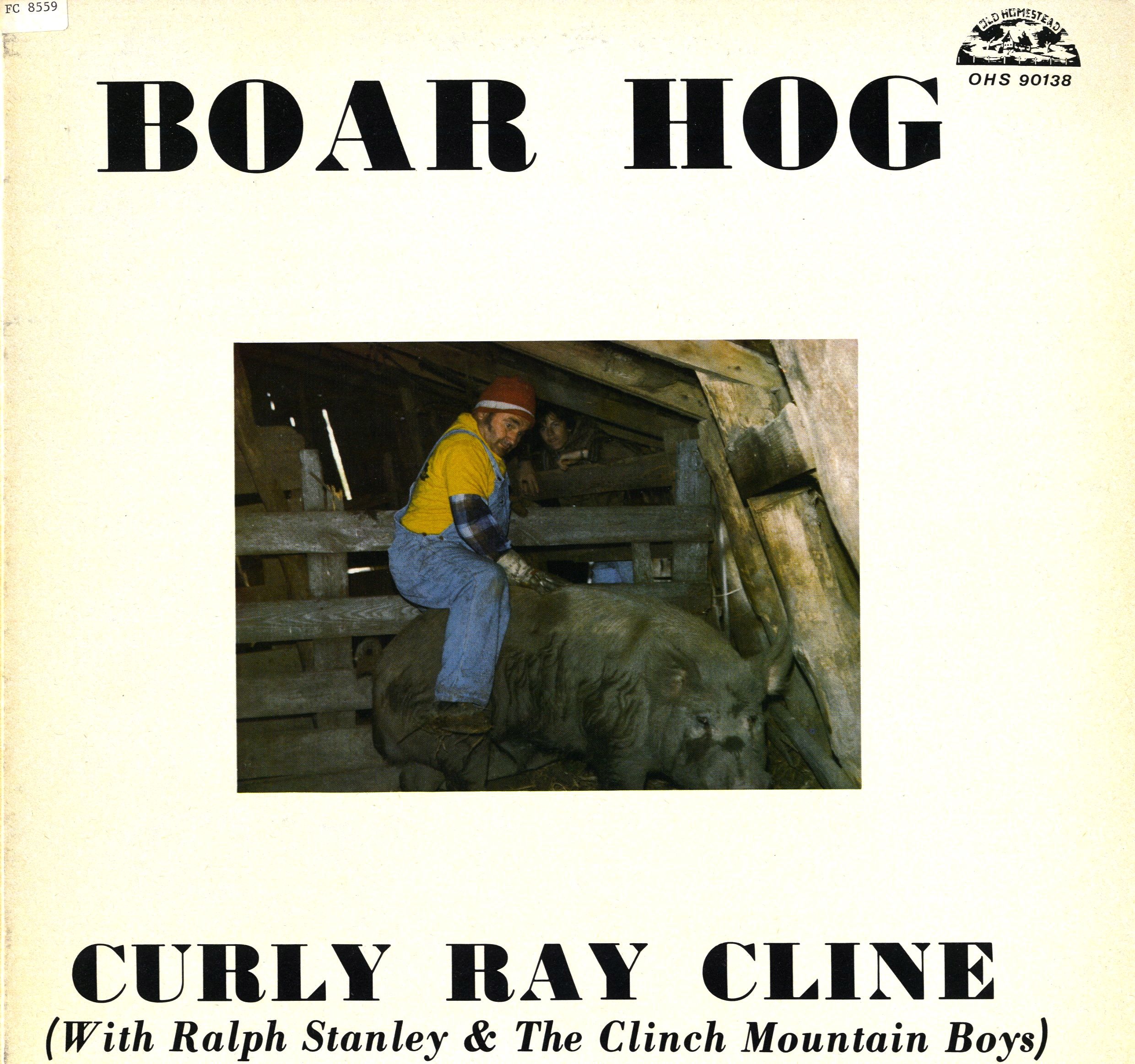
We recognize that some of you might prefer an entrée other than the noble bird when feasting on Thursday. Perhaps, like Curly Ray Cline, you’d rather serve the noble pig and we would not begrudge your decision, just as we would support our vegan folk compatriots with extra helpings of dairy-free pumpkin pie and whip up a casserole for the National Day of Mourning.
I wonder about Curly Ray’s pork preference because he is a personal friend of Dr. Ralph Stanley, and everyone knows, Dr. Stanley can call up some turkeys whenever he pleases. You can learn from the Doctor himself, documented on the record above, call no. FC8559 in the Southern Folklife Collection. Listen:FC8559_Curly Ray Cline_Boar Hog_Turkey Call
Truth is, we at the SFC duly honor the bird (there are at least 148 different versions of “Turkey in the Straw” in the Collection), but perhaps not as much as the legendary steel guitarist, Red Rhodes**, whose “Great American Thunder Turkey” from his 1979 release on Ashire Records Steel Guitar, call no. FC14363, has become the soundtrack to our archival lives.FC14363_RedRhodes_GreatAmericanThunderTurkey
Category: Uncategorized
SFC Serial of the week: Friday vibes with "Fretts" magazine
Yet again, a Southern Folklife Collection researcher query pointed me to an unfamiliar item. Paging through Fretts magazine, “news from the instrument world,” was a treat. We have a number of issues from the magazine’s 10 year publication run. Fretts featured a variety of articles: including profiles of prominent players across the musical spectrum, from classical to country and rock, as well as articles on guitar playing techniques, and technical histories of the instruments themselves. See the full list of issues available at the SFC in the UNC Library online catalog. We especially enjoyed the Fender guitar advertisements like the one below from the back page of vol. 1, 1965. I have never played a Stratocaster while skating, might have to remedy that come Thanksgiving.
Also, the Southern Folklife Collection is pleased to announce the launch of our new homepage. Check it out at the following link and tell us what you think. http://www.lib.unc.edu/wilson/sfc/
Election Day
In honor of election day we pulled out this Roy Acuff election poster from his run for governor in 1948. Signed “Sincerely, Roy Acuff, Aug. 26-72.” Call no. XOP30021_31, from the Southern Folklife Collection Posters, 1847-2008. Happy voting, y’all.
Photo of the Week: The Best of the Best, Jimmy Bryant and Speedy West
Jimmy Bryant and Speedy West, Capitol Records recording session, 1950s.
Gospel Boogie Friday: Red Foley and his Log Cabin Quartet
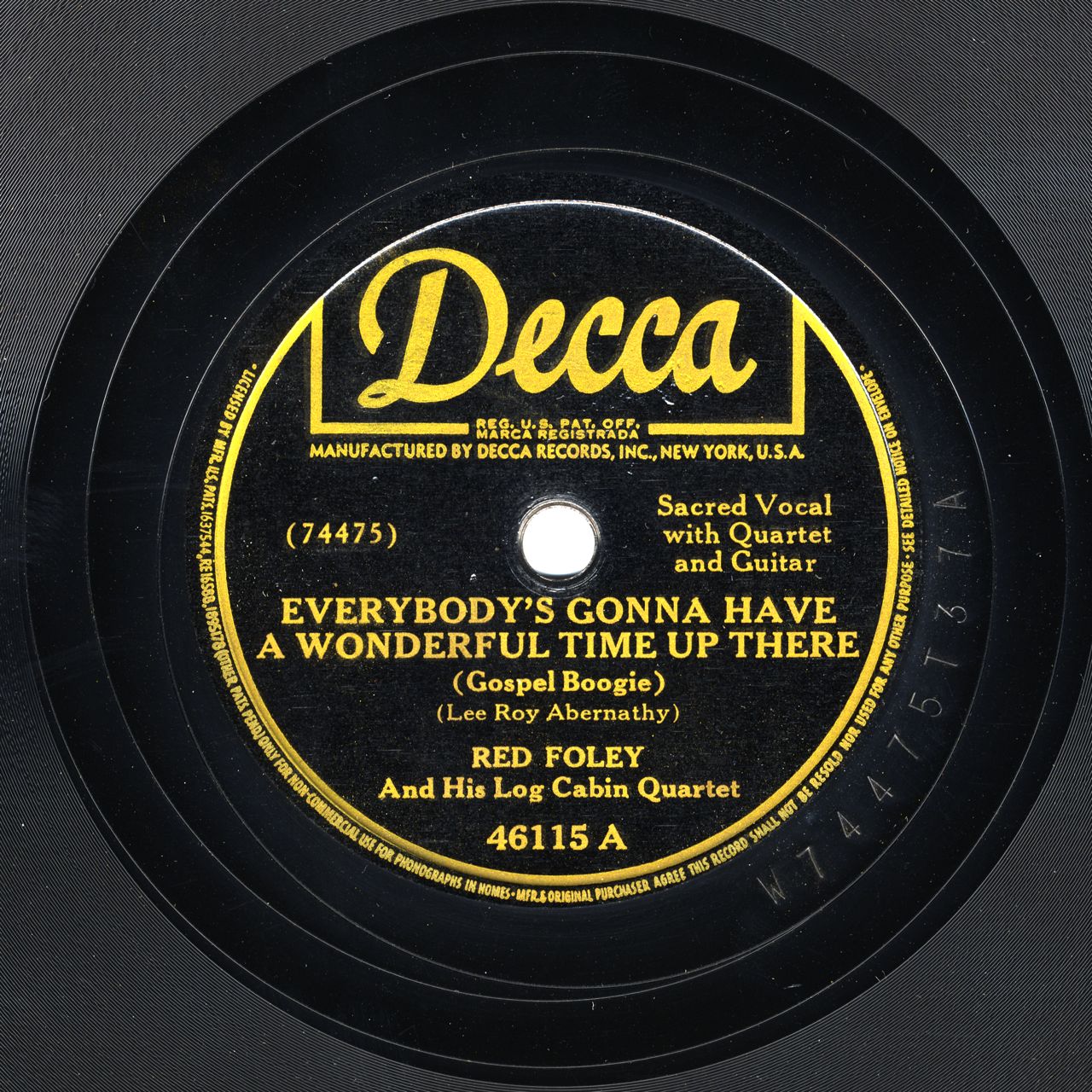 It’s always a pleasure when a researcher introduces us to a new tune. These two sides by the great Red Foley are some prime sacred boogie. Featuring members of his band from the 1940s, including Zeb Turner (born William Edward Grishaw, he renamed himself after a favorite piece of music, “The Zeb Turner Stomp”), the group adopted the style of popular African American jubilee gospel quartets. Foley was an extremely versatile musician, moving through old-time, country, blues, and pop with ease, however always maintaining the mellow smoothness that made him a country music star. Enjoy these clips of “Everybody’s Gonna Have a Wonderful Time Up There” and “Ride On, King Jesus” from call no. 78-6737. See you next week. 78_6737_EverybodysGonna78_6737_RideOn
It’s always a pleasure when a researcher introduces us to a new tune. These two sides by the great Red Foley are some prime sacred boogie. Featuring members of his band from the 1940s, including Zeb Turner (born William Edward Grishaw, he renamed himself after a favorite piece of music, “The Zeb Turner Stomp”), the group adopted the style of popular African American jubilee gospel quartets. Foley was an extremely versatile musician, moving through old-time, country, blues, and pop with ease, however always maintaining the mellow smoothness that made him a country music star. Enjoy these clips of “Everybody’s Gonna Have a Wonderful Time Up There” and “Ride On, King Jesus” from call no. 78-6737. See you next week. 78_6737_EverybodysGonna78_6737_RideOn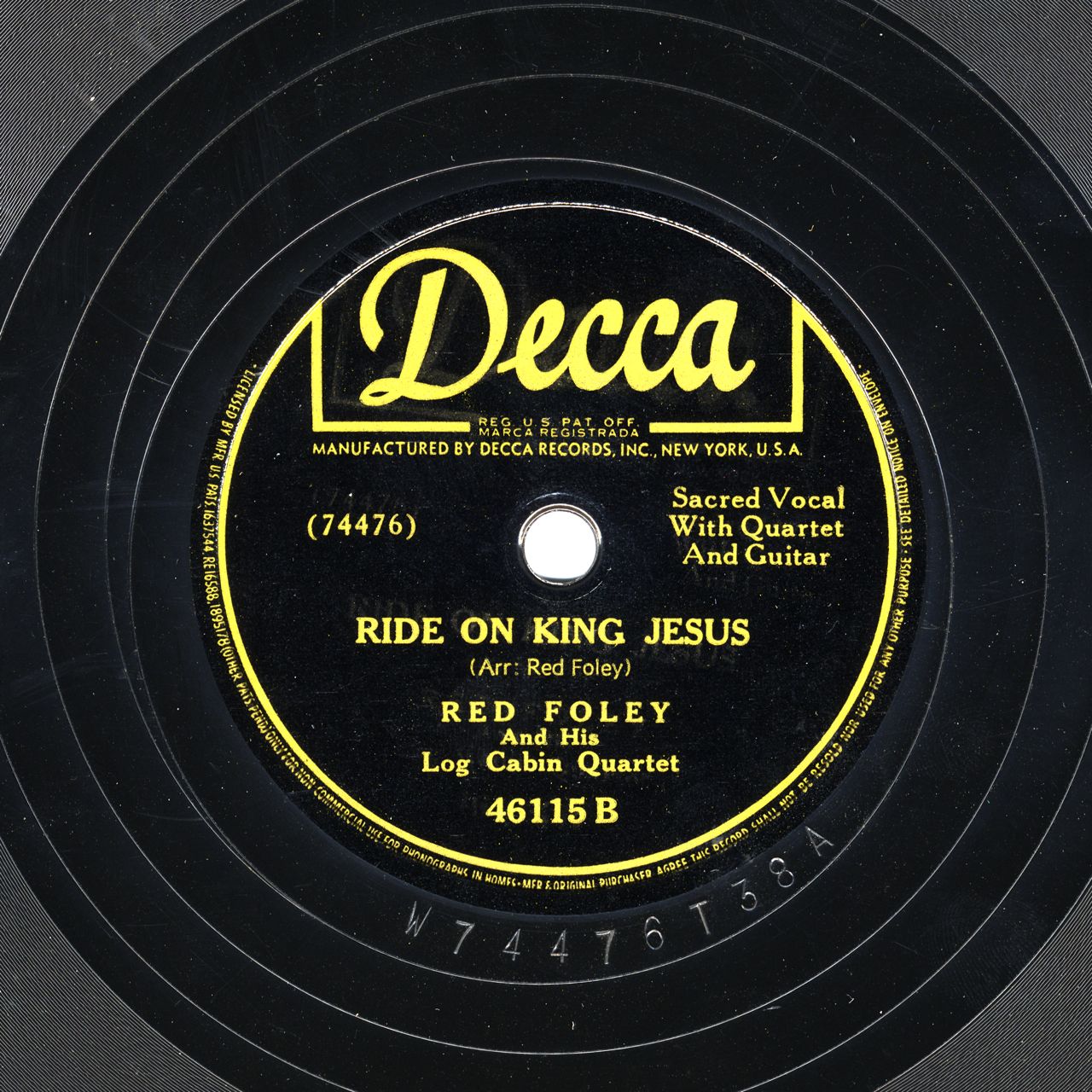
Listening to John Tchicai in the Southern Folklife Collection
 It is unfortunate that the catalyst for many of my forays into the Southern Folklife Collection archives is the death of an artist. Marion Brown, pictured above, has been on my mind lately because I recently picked up a copy of his brilliant 1973 LP, Geechee Recollections. Between spins I have been reading about Brown’s life and career (Brown died almost two years ago on October 23, 2010), and last night I heard via radio transmission from WXYC Chapel Hill, 89.3 FM, that saxophonist, composer and occasional Brown collaborator John Tchicai (also pictured above) had passed away on October 8.
It is unfortunate that the catalyst for many of my forays into the Southern Folklife Collection archives is the death of an artist. Marion Brown, pictured above, has been on my mind lately because I recently picked up a copy of his brilliant 1973 LP, Geechee Recollections. Between spins I have been reading about Brown’s life and career (Brown died almost two years ago on October 23, 2010), and last night I heard via radio transmission from WXYC Chapel Hill, 89.3 FM, that saxophonist, composer and occasional Brown collaborator John Tchicai (also pictured above) had passed away on October 8.
WXYC human deejay Evan Davis (who occasionally programs the Southern Folklife Collection radio show, “Hell or High Water,” on every Sunday from 1-2PM on WXYC, and whose broadcasts I highly recommend; Davis regularly takes listeners deep down into the rabbit hole and through the other side with some truly innovative programming) hosted an excellent retrospective of Tchicai’s career (see playlist here), featuring some of his collaborations with Europe’s greatest contemporary jazz performers and composers of the 1970s. The loss of another free jazz giant and the sounds shared by Mr. Davis resonated with me and offered the necessary encouragement to look for recordings of Tchicai in the SFC.
John Martin Tchicai was born in Copenhagen in 1936 with a Danish mother and a Congolese father and his musical career reflects the broad scope of his Afro-Danish-American heritage. After moving to New York in 1963, and he quickly became a leading exponent of avant-garde jazz as it developed in the 1960s and 1970s. Tchicai co-founded the New York Contemporary Five with Archie Shepp and Don Cherry, and soon after, the New York Art Quartet. Along with Shepp, Tchicai joined the 1965 ensemble recording session for John Coltrane’s Ascencion, from which the photo above was taken. The SFC has a pristine copy of Ascencion, call number FC21590.
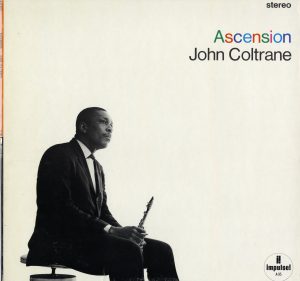 The LP held in the SFC is the original pressing of the album, known as “Edition I.” Edition I is the second recorded take of the composition and was originally released on Impulse in February 1966 (catalog number A-95). Tchicai takes the second solo on side 2 of the original pressing, Edition I. However Ascension was quickly repressed with “Edition II,” the preferred take of Coltrane. On that version Tichai appears as the first soloist on side 2. Listen to Tchicai’s solo from Edition I here:FC21590_Ascension_Edition 1_John Coltrane_John Tchicai
The LP held in the SFC is the original pressing of the album, known as “Edition I.” Edition I is the second recorded take of the composition and was originally released on Impulse in February 1966 (catalog number A-95). Tchicai takes the second solo on side 2 of the original pressing, Edition I. However Ascension was quickly repressed with “Edition II,” the preferred take of Coltrane. On that version Tichai appears as the first soloist on side 2. Listen to Tchicai’s solo from Edition I here:FC21590_Ascension_Edition 1_John Coltrane_John Tchicai
In 1966, Tchicai returned to Denmark. He formed the collective orchestra “Cadentia Nova Danica”, at one time a 30-piece ensemble, and recorded the groups excellent self titled album in 1968. Tchicai focused on teaching and his own spiritual practice in the 1970s, performing and recording less than the previous decade but still remaining productive. 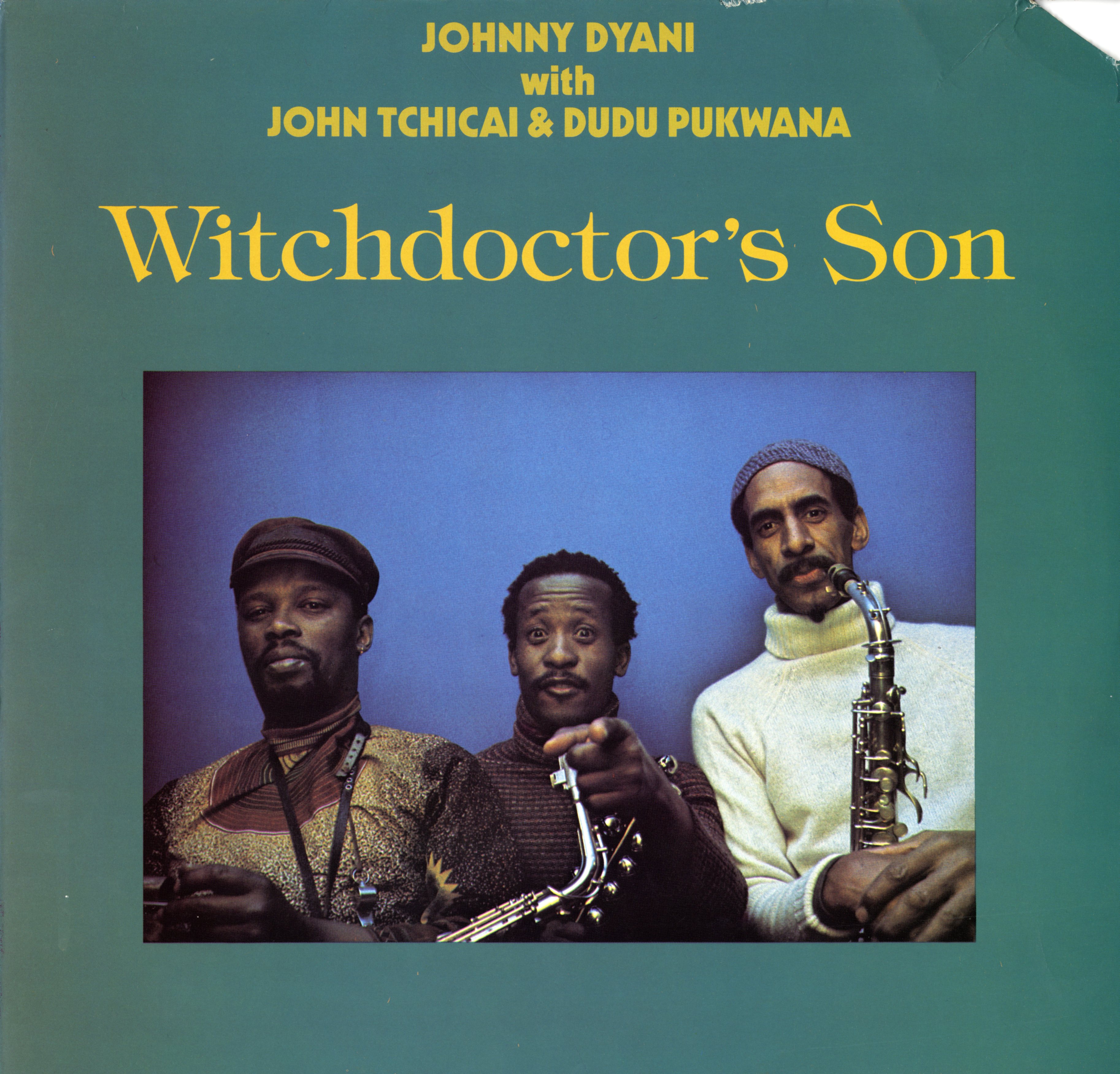
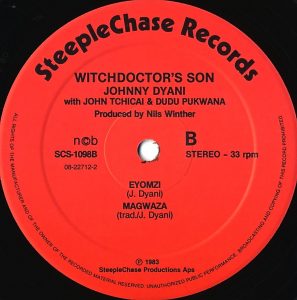 In 1978, Tchicai appeared on his first collaboration with South African bassist/composer Johnny Dyani and tenor saxophonist Dudu Pakwana, Witchdoctor’s Son, SFC call number FC24046. The ensemble’s recording of the traditional South African tune arranged by Dyani, “Magwaza,” remains a highlight of the record. Listen to an excerpt of Tchicai’s first solo below. (Click on photos to enlarge). FC24046_Magwaza_excerpt_Johnny Dyani with John Tchicai and Dudu Pukwana_Witchdoctor’s Son
In 1978, Tchicai appeared on his first collaboration with South African bassist/composer Johnny Dyani and tenor saxophonist Dudu Pakwana, Witchdoctor’s Son, SFC call number FC24046. The ensemble’s recording of the traditional South African tune arranged by Dyani, “Magwaza,” remains a highlight of the record. Listen to an excerpt of Tchicai’s first solo below. (Click on photos to enlarge). FC24046_Magwaza_excerpt_Johnny Dyani with John Tchicai and Dudu Pukwana_Witchdoctor’s Son
 There are a few other recordings of Tchicai in the SFC but I wanted to close this post with an album he recorded with pianist Cecil Taylor in Italy in October of 1984, Winged Serpent (Sliding Quadrants), SFC call number FC23682. Tchicai plays tenor on this album, forming part of an 11 piece ensemble (including altoist Jimmy Lyons, basoonist Karen Borca, and bassist William Parker) that sounds as colorful and dense as the album’s cover art. A joyful noise indeed. Rest in peace, John Tchicai.
There are a few other recordings of Tchicai in the SFC but I wanted to close this post with an album he recorded with pianist Cecil Taylor in Italy in October of 1984, Winged Serpent (Sliding Quadrants), SFC call number FC23682. Tchicai plays tenor on this album, forming part of an 11 piece ensemble (including altoist Jimmy Lyons, basoonist Karen Borca, and bassist William Parker) that sounds as colorful and dense as the album’s cover art. A joyful noise indeed. Rest in peace, John Tchicai.

Bobby Rush Raw and in Person
Bobby Rush visited the Southern Folklife Collection yesterday and gave a fantastic solo performance to a few lucky listeners (I see you, “Clarksdale”) who braved the storm to attend the first concert in the 2012 Southern Journey Fall Concert Series.
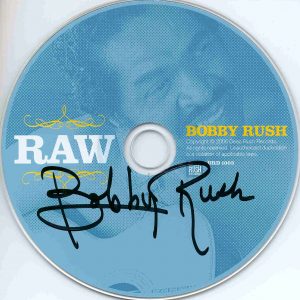 It was a rare opportunity to see and hear Bobby Rush performing acoustic and sharing stories of his long and remarkable career as a bluesman, as a runner for Elmore James, getting guitar lessons from Howlin’ Wolf, riffing on Tony Jo White, and even a story of how he got his name, Bobby Rush.Bobby Rush Clip 1_mp3
It was a rare opportunity to see and hear Bobby Rush performing acoustic and sharing stories of his long and remarkable career as a bluesman, as a runner for Elmore James, getting guitar lessons from Howlin’ Wolf, riffing on Tony Jo White, and even a story of how he got his name, Bobby Rush.Bobby Rush Clip 1_mp3
We also picked up a copy of one of his recent albums (Bobby Rush has released over 250 albums in over 50 years of recording music). Entitled Raw, Bobby Rush strips down the songs to their fundamentals, using only his guitar, harmonica, voice, and feet percussion. This is a different side of Bobby Rush, but we like it just as much as the master showman of southern R&B that we are used to (although we did kind of miss the costume changes and backup dancers).
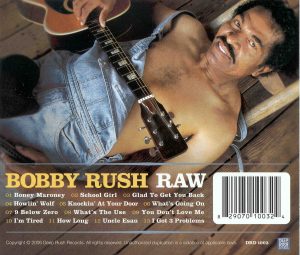
Hear for yourself; listen to some more clips of Bobby Rush’s performance below and remember Tommy Edwards will be here playing North Carolina bluegrass in our second installment of the Southern Journey Concert Series on October 2. See you at Wilson Library at 11 AM, October 2!
Bobby Rush Clip 2_mp3
Bobby Rush_SFC Fall Concert Series_18 September 2012 Clip 3_mp3
Southern Journey Fall Concert Series kicks off Tuesday September 18
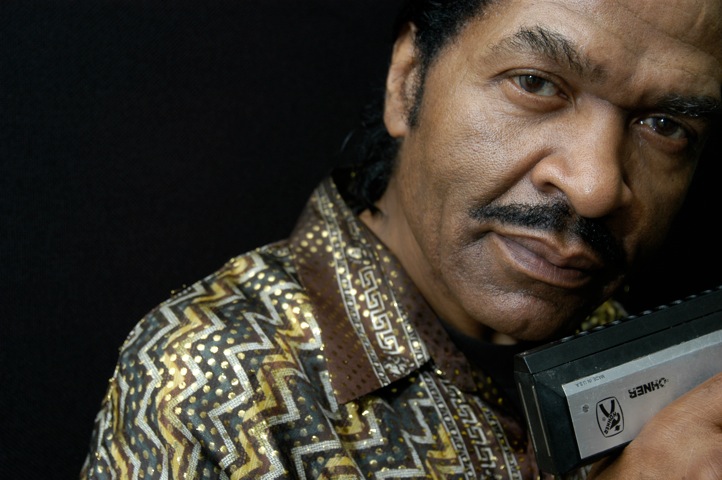 The Southern Journey Fall Concert Series kicks off next Tuesday, September 18 with a performance by legendary bluesman Bobby Rush (pictured above). Future concerts will feature local bluegrass musician Tommy Edwards and his band on October 2 the New Orleans R&B of JoJo Herman and Alfred “Uganda” Roberts on November 8. All events are free and open to the public. Bobby Rush will appear 11AM to 12PM in the Pleasants Family Assembly Room, Second Floor, The Wilson Library, on the campus of UNC Chapel Hill. Please join us and come back for updates on future Southern Journey concert events.
The Southern Journey Fall Concert Series kicks off next Tuesday, September 18 with a performance by legendary bluesman Bobby Rush (pictured above). Future concerts will feature local bluegrass musician Tommy Edwards and his band on October 2 the New Orleans R&B of JoJo Herman and Alfred “Uganda” Roberts on November 8. All events are free and open to the public. Bobby Rush will appear 11AM to 12PM in the Pleasants Family Assembly Room, Second Floor, The Wilson Library, on the campus of UNC Chapel Hill. Please join us and come back for updates on future Southern Journey concert events.
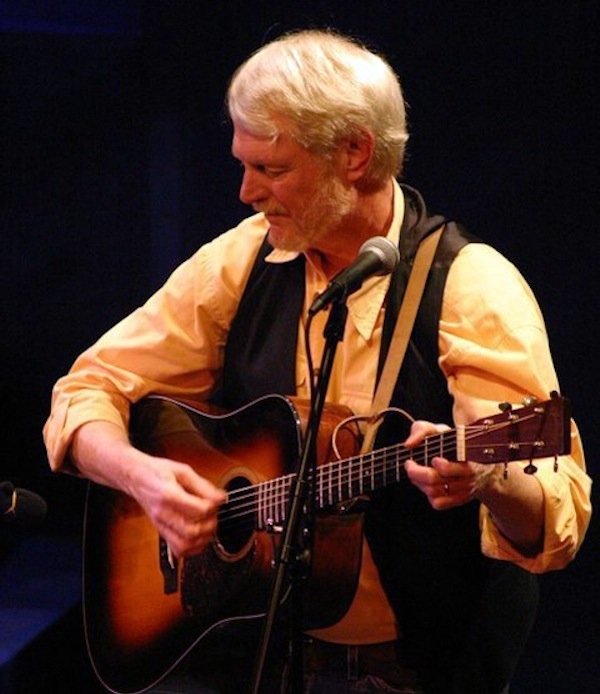
The Southern Journey Fall Concert Series is sponsored by The Southern Folklife Collection, the Center for the Study of the American South, the UNC College of Arts and Sciences, Department of American Studies and Department of history. For more information contact Steve Weiss 919 962 7105.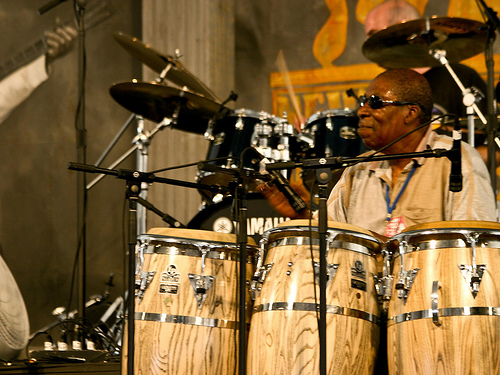
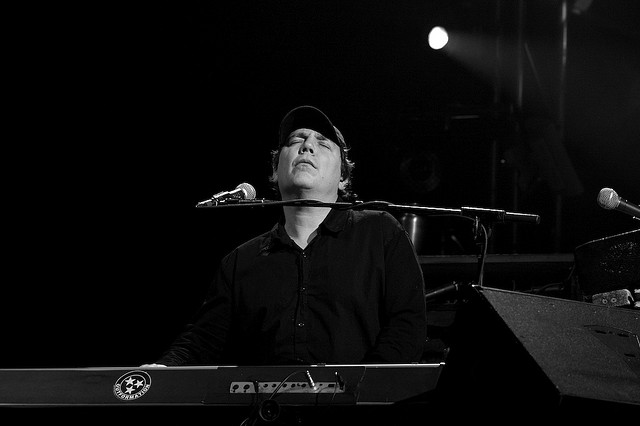
SFC Spotlight: Barbara Allen, the Song Without a Single Tune

As one of the most oft-played folk ballads in the Western tradition, the commonly titled “Barbara Allen” has spawned so many variations it’s nearly impossible to identify a primary tune. Reaching the height of its popularity during the 17th and 18th centuries in the British Isles and America, the ballad has been sung in parlors and on front porches for hundreds of years. It has branched into countless forms, known variously as “Barbary Allan,” “John Armstrong’s Last Good-night,” and “The Cruelty of Barbara Allen,” among many others (Source: Francis Child’s English and Scottish Ballads ).
Charles Seeger, the renowned American musicologist (1886 –1979), visited these parlors, collecting field recordings from all over the country on a quest to locate the definitive “Barbara Allen” tune. Drawing samplings from North Carolina to Michigan to California, he selected 30 renditions to study, 15 sung by women and 15 by men. The Southern Folklife Collection houses his compilation of the recordings on the Versions and Variants of Barbara Allen , accompanied with a detailed draft brochure.
After listening to the recordings and categorizing them according to musical mode into versions and variants, Seeger concludes that “no such entity as ‘the Barbara Allen tune’ can be set up…, however, two versions have such distinct characters.” The first version sounds completely unlike any of today’s more popular recordings of the ballad because of its archaic melody. Seeger states, “Version I in the AAFS seems to bear no relationship to conventional major or minor modality and the concept of tonality.” Here is a recording of a middle-aged man singing a variant of Version Ia “Barbara Allen”:
Barbara Allen Sample 1
In contrast, the second version sounds much more pleasing to the ear because “Version II will seem…closely related to our conventional major mode.” Here is a recording of an older woman singing Version IIa:
Barbara Allen Sample 2
The lyrics of this ballad tell the haunting story of Barbara Allen’s cold rejection of a dying man’s love, and her regrets as she hears the death bell toll. Realizing her mistake, she chooses death also and is buried next to her unrequited lover. Two examples of the opening verse of the ballad include:
The red buds they were swelling
Sweet William upon his dead bed a lie
For the sake of Barbry Allen
When all the flowers were a blooming
Sweet William on his death bed lay
For the love of Barbara Allen
While the lyrics vary from recording to recording, all versions share the same central plot. But, because the story’s spirit changes as the tune evolves, listening to the 30 variants remains captivating. The differences between minor and major modes, quick or dragging tempos, and the color of each singer’s voice uncover multiple levels and moods of Barbara Allen’s tragic story. One man sings the ballad like a cautionary tale to young lovers; another woman sings as if she were Barbara Allen herself, mourning a personal experience. In this way, Charles Seeger’s Versions and Variations of Barbara Allen celebrates how a ballad is neither singular nor static but a living history of time and place.
Southern Folklife Collection Banjo Symposium: Schedule, Saturday August 25
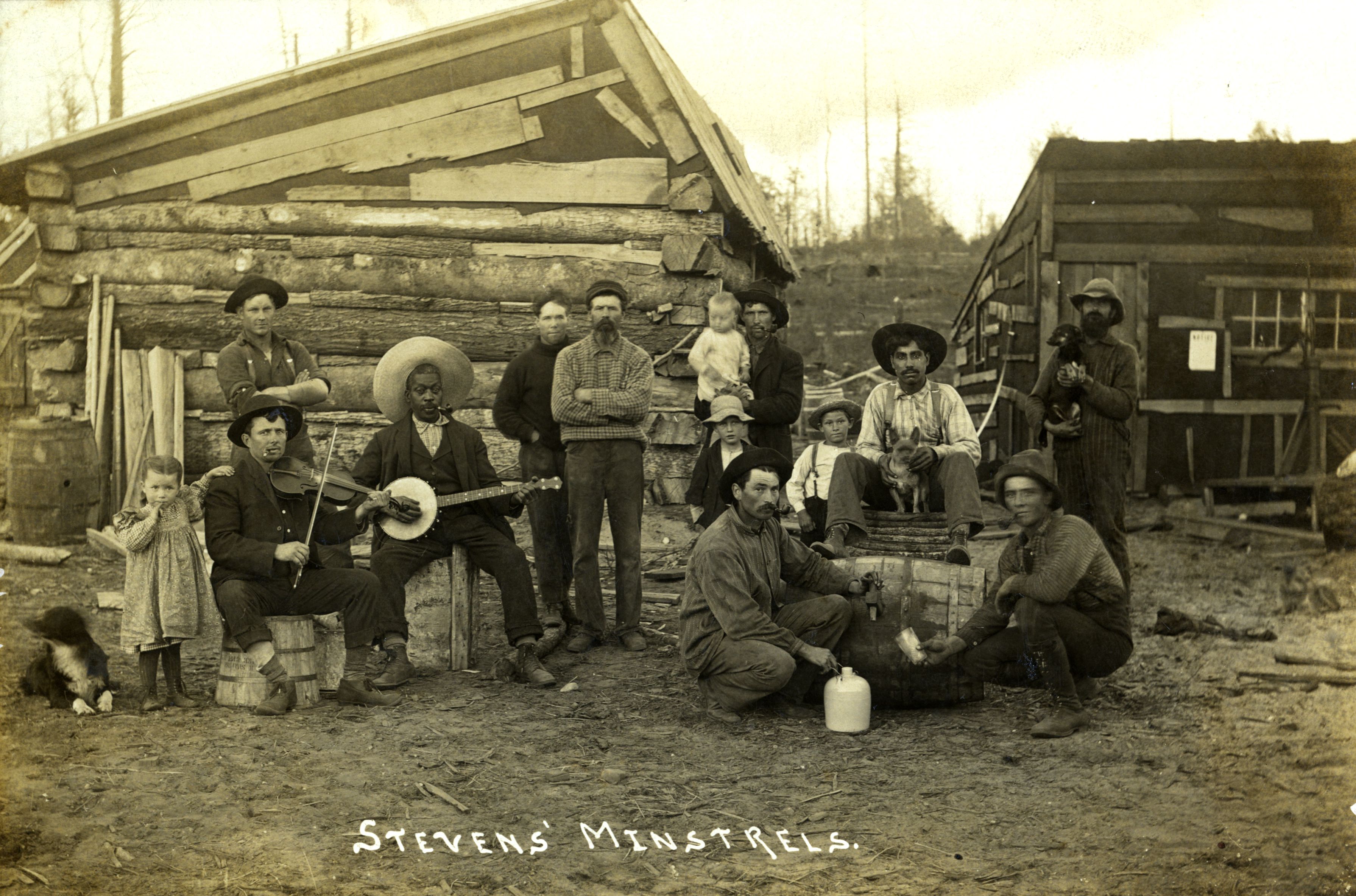 The inaugural event in the Southern Folklife Collection Instrument Series, The Banjo: Southern Roots American Branches is coming up in just three days. Many people have asked for a schedule of the daytime symposium in Wilson Library. Please see below. Tickets are still available for the free concert, Saturday August 25 in Memorial Hall on UNC’s campus, featuring master pickers Tony Trischka, Dom Flemons of the Carolina Chocolate Drops, and Riley Baugus with Kirk Sutphin. This is a free but ticketed event. Contact the Memorial Hall Box Office, 919.843.3333 for information.
The inaugural event in the Southern Folklife Collection Instrument Series, The Banjo: Southern Roots American Branches is coming up in just three days. Many people have asked for a schedule of the daytime symposium in Wilson Library. Please see below. Tickets are still available for the free concert, Saturday August 25 in Memorial Hall on UNC’s campus, featuring master pickers Tony Trischka, Dom Flemons of the Carolina Chocolate Drops, and Riley Baugus with Kirk Sutphin. This is a free but ticketed event. Contact the Memorial Hall Box Office, 919.843.3333 for information.
Banjo Symposium – Pleasants Family Assembly Room, 2nd Floor, Wilson Library, UNC-Chapel Hill
9:30am: Reception
10:00am: Phillip Gura, UNC Professor of American Studies; Author of America’s Instrument: The Banjo in the 19th Century
10:45am: Coffee break
11:00am: Bob Carlin, Musician and Author of The Birth of the Banjo & Jim Mills, musician (Ricky Scaggs, Vince Gill) Six time winner of IBMA Banjo Player of the Year Award.
11:30am: Robert Cantwell, UNC Professor of American Studies; Author of Bluegrass Breakdown
12:15pm – 2:00pm: lunch
2:00pm: Stephen Wade, Musician and Author of The Beautiful Music All Around Us: Field Recordings and the American Experience
2:45 – Coffee break
3:00pm: Panel discussion–Laurent Dubois, Duke Professor of Romance Studies and History; Cecelia Conway, Appalachian State University Professor of English; Author of African Banjo Echoes in Appalachia; Dom Flemons, musician (Carolina Chocolate Drops)
4:00pm – End
7:30pm: Concert in UNC Memorial Hall

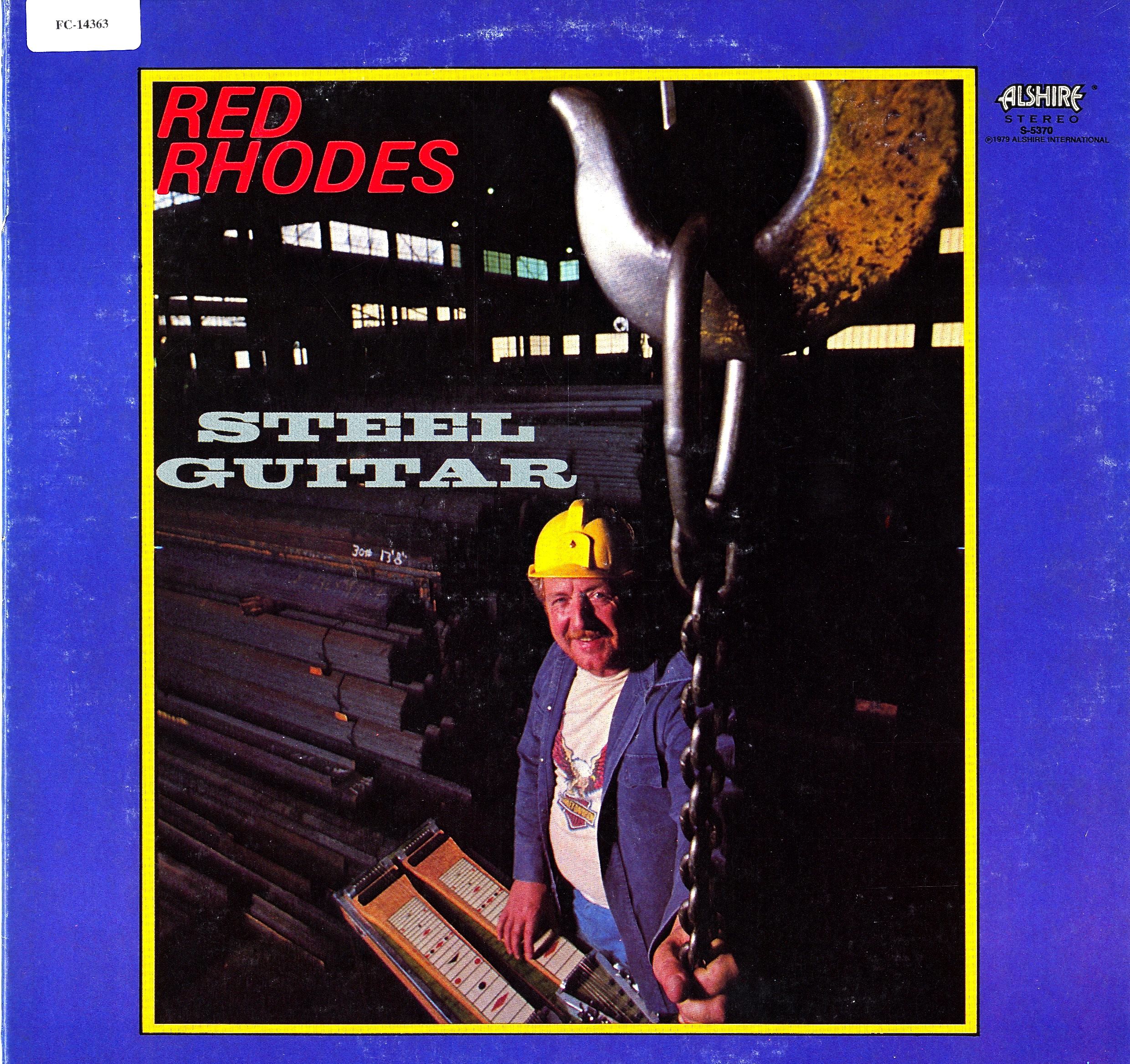
![Fretts [serial]_1964_vol2_cover](https://blogs.lib.unc.edu/sfc/wp-content/uploads/sites/9/2012/11/Fretts_1964_vol2_cover.jpg)

